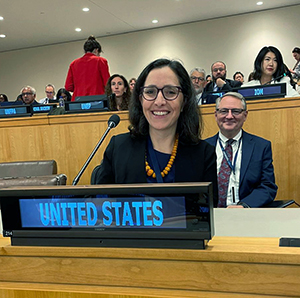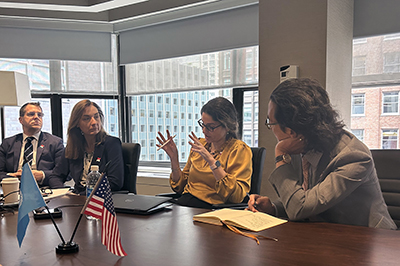CDC and Global Partners Commit to Collective Action to Combat Antimicrobial Resistance
Posted on byIn late September 2024, global leaders gathered in New York City for the second United Nations General Assembly High-level Meeting (UNGA HLM) on Antimicrobial Resistance.
Since the first UNGA HLM on Antimicrobial Resistance in 2016, the United States (U.S.) has made tremendous progress toward the goals in the U.S. National Action Plan for Combating Antibiotic-resistant Bacteria. This progress—which could not have been made without dedicated efforts from the U.S. Government and our partners working across One Health—demonstrates what is possible with collective effort toward shared goals and targets. The UNGA HLM provided a platform for CDC and global partners to continue to identify and commit to actions needed to combat antimicrobial resistance.
CDC took the opportunity afforded by the UNGA HLM and surrounding events to share the impact of our investments in:
- Building laboratory and surveillance capacity
- Strengthening infection prevention capacity
- Improving appropriate antibiotic and antifungal use
- Increasing antimicrobial resistance awareness and knowledge
- Advancing innovation and research
The UNGA HLM was also an opportunity to create new connections and strengthen established partnerships with governmental and non-governmental partners across the globe.
Highlights from UNGA
Ensuring Sustainable Access to Effective Antibiotics: The Path from UNGA to Impact
On September 22, One Health Trust, CDC, and other partners co-hosted a side event where representatives from across the world discussed targets and shared feasible solutions to combating the growing public health threat of antimicrobial resistance. I spoke on a panel that acknowledged the limited consistent global data on knowledge, attitudes, and beliefs about antimicrobial resistance. To address this data gap, CDC is partnering with CDC Foundation and Gallup to develop the Global AMR Monitor which will use the Gallup World Poll to gather representative data on antimicrobial resistance knowledge, attitudes, and behaviors from countries across the world.
At the side event, Gallup presented results from the first phase of the Global AMR Monitor, which consisted of in-depth interviews and focus groups with representatives from the general public, doctors, pharmacists, veterinarians, and farmers from the United States, India, and South Africa. The preliminary results highlighted three major themes:
- There are varying levels of antimicrobial resistance knowledge and concern
- There is a lack of consistency in actions regarding the appropriate use of antibiotics
- There is a lack of awareness or belief that inappropriate use of antibiotics can lead to an emergence of antimicrobial resistance
The second phase of the Global AMR Monitor project, which is contingent on funding becoming available, will leverage the information gained in the first phase to monitor and track antimicrobial resistance knowledge, attitudes, and behaviors over time and in more than 140 countries.
Infection Prevention and Control and Antimicrobial Stewardship: From Policy to Implementation at the Point of Care
Hosted by Oman and co-hosted by the United States and other countries, this side event focused on increased commitment to infection prevention and control and antimicrobial stewardship programs, highlighting programs that are easy to implement. Leaders talked about cost-effective strategies for antimicrobial resistance control at national, regional, and global levels and how to track progress and facilitate accountability for key priorities of antimicrobial resistance action plans.
CDC’s Dr. Dan Jernigan, Director of the National Center for Emerging and Zoonotic Infectious Diseases, spoke about the U.S. experience with infection control and antimicrobial stewardship. He highlighted how CDC provides national leadership in healthcare-associated infection surveillance to improve healthcare quality and safety through the National Healthcare Safety Network (NHSN). Jernigan also spoke about CDC’s work to build infection control and prevention capacity in U.S. health departments, U.S. healthcare facilities, and in partner countries as well. Through monitoring progress in improving infection prevention and control, CDC has seen the impacts these programs can make in protecting patients and improving healthcare quality. Jernigan also spoke about the importance of improving antibiotic use to combat antimicrobial resistance by developing antibiotic stewardship strategies that healthcare facilities can implement in inpatient and outpatient settings.
UNGA HLM on Antimicrobial Resistance
On September 26, global leaders met and adopted the UNGA HLM on Antimicrobial Resistance political declaration, which established global goals, commitments, and targets for combating antimicrobial resistance, including a goal to reduce global deaths associated with bacterial antimicrobial resistance by 10% by 2030. The political declaration identifies specific prevention interventions in health care and communities, including:
- Immunization (reduces infections and antimicrobial use)
- Early and accurate detection of pathogens
- Infection prevention and control
- Water, sanitation, and hygiene (WASH)
CDC Leaders in Action at UNGA

Andi Fristedt, CDC Deputy Director/Chief Strategy Officer, and Dr. Dan Jernigan attended the UNGA High-level Meeting on Antimicrobial Resistance. Andi delivered the U.S. statement on antimicrobial resistance in a multi-stakeholder panel during the HLM on September 26.
 Dawn Sievert, Senior Science Advisor in the Antimicrobial Resistance Coordination and Strategy Unit, Fernanda Lessa, Chief of the International Infection Control Branch, and Ben Park, Senior Advisor in the Antimicrobial Resistance Coordination and Strategy Unit joined myself and other global leaders to discuss how CDC will continue to combat antimicrobial resistance across the world with the help of our global partners.
Dawn Sievert, Senior Science Advisor in the Antimicrobial Resistance Coordination and Strategy Unit, Fernanda Lessa, Chief of the International Infection Control Branch, and Ben Park, Senior Advisor in the Antimicrobial Resistance Coordination and Strategy Unit joined myself and other global leaders to discuss how CDC will continue to combat antimicrobial resistance across the world with the help of our global partners.
Summary of UNGA Outcomes
Through engagements at the UNGA HLM, side events, and meetings with partners, CDC was able to identify the specific and concrete actions each of us will need to take to meet the commitments and achieve the targets outlined in the HLM political declaration. CDC looks forward to continuing our work with domestic and global partners in advancing the newly established commitments and targets under the political declaration.
Check out @CDC_AR on X to see these engagements and more details about the HLM and side events.
Author:
Michael Craig, MPP | Blogs | CDC
Michael Craig is the Director of CDC’s Antimicrobial Resistance Coordination and Strategy Unit.
Posted on by

